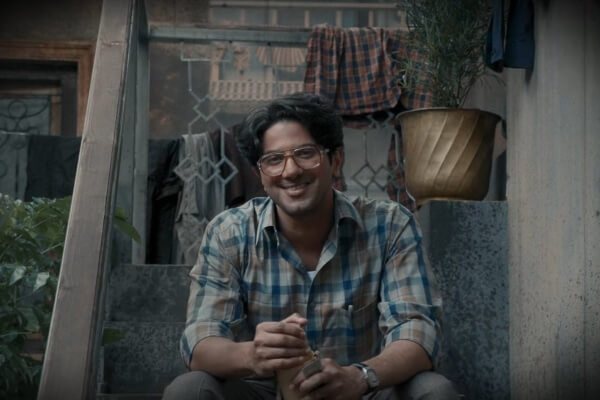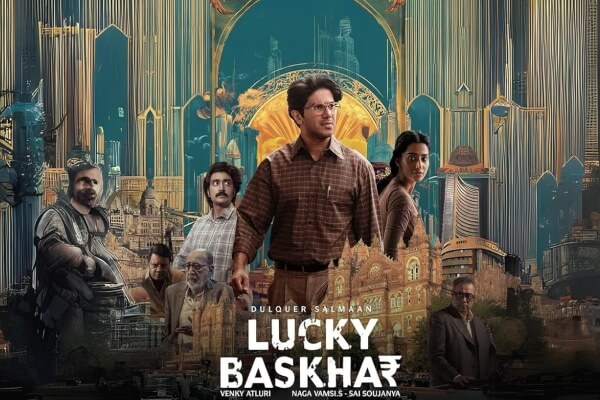Lucky Baskhar is a film that blends the thrill of financial crime with the emotional weight of a character-driven drama. By giving its protagonist the rare opportunity to make morally sound choices, it offers a refreshing take on the genre while keeping audiences on the edge of their seats.
AT A GLANCE:
Film: Lucky Baskhar (Netflix)
Writer & Director: Venky Atluri
Cast: Dulquer Salmaan, Meenakshi Chaudhary, Tinnu Anand, P. Sai Kumar, Ramki, Raghu Babu, Maanasa Choudhary, Sarvadaman D. Banerjee, Kalyani, Sachin Khedekar, Kasi Viswanath, Sudha, Rajkumar Kasireddy, Prabhas Sreenu, Hyper Aadi, Sivannarayana Naripeddi, Gayatri Bhargavi, Mathew Varghese, Srinath Maganti, Micky Makhija, Srikanth Reddy, Manava Koteshwar Rao, Lab Sharath, Ram Sandeep Varma Jampana, Anji Chodapaneedi, Rahul, Mahesh Achanta, Manik Reddy, Mukhtar Khan, S. P. Prabhu, Krishna Kamal, Shashidhar, Ananya Sharma, Rithvik, Charan Lakkaraju, Surya Sreenivas, Jayasri Rachakonda
Cinematography: Nimish Ravi
Music: G. V. Prakash Kumar
Duration: 151 minutes
Rating: ****
From the title itself, Lucky Baskhar offers a cheeky nod to irreverence, playing on the phrase “lucky bastard.” It’s an audacious prelude to a film that’s bold in its storytelling while striking a clever balance between amoral drama and heartfelt sentimentality in its screenplay. Venky Atluri directs the film with finesse, subverting expectations while giving its protagonist the rare chance to make the “right choices” when it mattered most.
Starring Dulquer Salmaan as Baskhar Kumar, a man caught between his need for money and the reality of his moral compass, the film delivers a rags-to-riches story with a twist: instead of burning everything down in pursuit of greed, it gives the audience something unusual—a protagonist who knows when to stop. While most heist films revel in the inevitable downfall brought on by hubris, Lucky Baskhar dares to let much of its protagonist’s success be blamed—or credited—to “luck.”
The film’s cinematography is a visual treat, and the art direction stands out for brilliantly anchoring the story in a believable world. From bustling ’90s Bombay streets to quiet domestic interiors, the settings are immersive, adding depth and context to Baskhar’s journey.

A defining feature of Lucky Baskhar is its fourth-wall breaks. While this narrative device has been polarising in cinema, here it’s used sparingly and cleverly. Baskhar’s direct engagement with the audience deepens our understanding of his internal struggles, bringing us closer to his moral dilemmas. Instead of breaking immersion, these moments feel like whispers of gossip, pulling us further into the story.
The heist itself is logically airtight and easy to follow. Without giving too much away, it rallies between outcomes by introducing a unique twist that makes the film different. Just when you think you’ve figured out the trajectory of the plot, Atluri surprises you with a heist of his own. (This climactic turn left me reeling and a tad betrayed simultaneously which was fascinatingly immersive as I bore too easily.)

The screenplay is a triumph. It tugs at quintessential middle-class Indian family sentiments, leveraging their struggles to humanise Baskhar’s motives and actions. The writing intricately weaves Baskhar’s financial schemes with his personal life, like interactions with his wife’s family that raised the stakes of his internal conflict, making it impossible not to root for him—even when he’s being unethical. This thematic layer adds a philosophical richness to the film, asking viewers to grapple with the true meaning of wealth in a morally grey world.
This narrative empathy is what elevates the film. Baskhar’s love for his family and his desperation to secure a better future are relatable, even if his methods are not. Dulquer Salmaan’s nuanced performance only amplifies this, making Baskhar’s victories feel like our own. His character’s arc is explored deeply, and every decision he makes carries the weight of his responsibility as the breadwinner of the family.

Meenakshi Chaudhary, who plays Baskhar’s wife Sumati, delivers a standout performance, becoming Baskhar’s moral compass. Though under explored, her character isn’t merely a middle-class ’90s Indian wife but a pivotal element of the story’s structure. Her relationship with Baskhar and her interactions with her own family are woven into the narrative to underscore her symbolic role. In the second half, Sumati becomes Baskhar’s torchlight influencing his choices and how the audience perceived them.
Lucky Baskhar is as sharp as its narrative. It was refreshing to see the film speak to men who felt pressured to provide and be the sole breadwinner of a family in the ’90s. This might have made rooting for Baskhar, a more intimate affair for men who feel the same today. Atluri’s final trick and G.V Prakash Kumar’s use of sound effects in those scenes had me fooled in a very cool way. I would definitely recommend the film for something new and fun.
Read Also: Indian films and series to watch in December 2024



